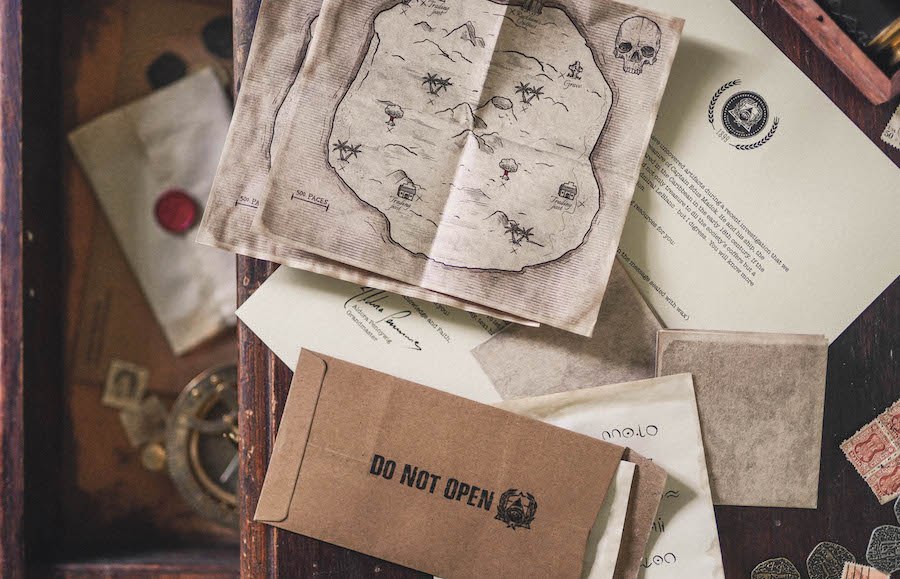Yacine and I have bad luck with cancellations. Two hours before our Sleep No More Show, we received an email notifying us it was canceled. Our Cutthroat Cavern game was canceled the night before we were to play. Life and Trust was abruptly closed ten days before our booking and days before seeing Delusion: The Red Castle, our slot was removed.
Each of these experiences was something we had planned our travel around—unique, top-tier events we’d invested heavily in just to attend. These weren’t just nights out; they were the core reasons for our trips. And with each unexpected cancellation, I’ve found myself thinking more critically about how the escape room industry handles cancellations—and how it could do better.
Travel-Worthy Experiences
There’s a growing trend of escape room enthusiasts traveling the globe to experience the best games out there. These trips are often tightly packed, with little flexibility-some of our friends even struggle to find time to eat, their schedules are so game-heavy!
As we bounce between our home in Hawai’i and our soon-to-be escape room bed-and-breakfast in Quebec, we’ve started incorporating quick stopovers to play some of the most talked about games. The Man From Beyond, Servants of Slight, Mogollon Monster, The Nest, Hope End, The Jazz Parlor, The Storykeeper, The Body Shop-we’ve traveled for all of them and they were so worth it! When the experience lives up to the hype, we ride that unforgettable “escape room high.”
But when a game you’ve been anticipating gets canceled, especially after you’ve flown in and built a trip around it, the disappointment cuts deep. For these destination-worthy experiences, the stakes are higher. And that makes the way cancellations are handled all the more important.
Cancelling on Ticket Holders
In nearly every cancellation we’ve faced, we received the same cold email: “Your event is canceled. You’ll be refunded.” No warmth. No explanation. No effort to help. Only Delusion attempted to reschedule us-though unfortunately, our schedule was already full.
Sleep No More and Life and Trust were the most frustrating: no explanation, no options, just the sterile notice of cancellation. It left us confused, upset, and unsure of what to do next.
We understand that sometimes, things go wrong. Even the best made plans A,B, C and D can fail. Sometimes you have no choice but to cancel a game or show. We had to do it in our own business when there was a city-wide power outage. But the way you cancel matters. Here are some suggestions of ways to handle cancelations:
- Be human. Acknowledge the disappointment and, if possible, explain why the cancellation happened. Most players are reasonable if they understand the situation. I was stunned when Sleep No More canceled without any explanation-so were the guests being turned away at the door. Even the staff didn’t know what was going on. That uncertainty turns frustration into anger.
- Be helpful. Refunds should be automatic – customers shouldn’t have to do any work to get their money back. If there is an option to rebook, make it as easy as possible.
- Offer alternatives. When Sleep No More canceled, I wish they’d helped us find another show. My brother and his girlfriend (who flew in from Portland to see the show) were running from box office to box office to find affordable tickets with an hours notice. If you’re an escape game, recommend other companies or something else that players might enjoy. Or go one step further and research what’s available to make specific recommendations.
- Call your customers. We walked down to Sleep No More when it was canceled – just to make sure there wasn’t a mistake. There were so many attendees who were being turned away at the door! They hadn’t gotten the email!
Many travelers don’t check their emails often – especially foreign travelers. For last-minute changes, phone calls or even texts (though less personal) are essential. The key is ensuring the message is actually received.
- Consider taking a financial loss. One of our games was canceled because it was an open booking system with a four player minimum. We had booked into an existing two player group to make four but then those two players canceled, thereby canceling us as well. I would have loved for the company to allow us to play as a group of two and possibly help us with more hands on puzzles if needed. We had flown in and rented a car specifically for this game and the cancellation for this reason left a bad taste in our mouths. Our financial loss was far greater than the loss the company would have taken by allowing just two players.
- Make your customer feel taken care of. What else can you do to turn around a disappointing situation? Discounts and freebies aren’t always the right fit, but what can be done to make players know you care for them? A thoughtful message, a genuine effort to make it right—these moments are a chance to build customer loyalty and leave a positive impression in a tough situation.
- Make an action plan. Every staff member should know what to do when a cancellation happens. A clear, guest-focused protocol ensures consistency and care. Be prepared and treat your guests as you’d like to be treated.
Final Thoughts
Cancellations are never fun—for businesses or guests. But how they’re handled makes all the difference. With a little empathy, communication, and planning, it’s possible to turn a negative situation into one that still feels respectful and thoughtful. Especially in an industry driven by passion and word of mouth, those moments matter.
What do you think? Agree? Disagree? Have other suggestions? I’d love to hear your thoughts! The escape room and immersive industry is still evolving and it’s great to keep pushing the envelope in guest experience.


